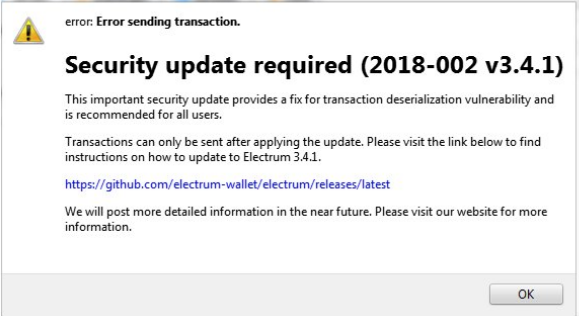Hackers Siphon Bitcoin In Electrum Wallet Attack

Share this article
If you’ve been buying the dip, you may want to brush up on good security. Crypto wallets are being targeted by cybercriminals, most recently with a phishing attack on the popular Electrum software wallet. Based on blockchain data, at least 200 BTC, worth nearly $730,000, have already been sent to the attacker’s bitcoin address.
While the wallet software itself appears to be secure, the hackers are using dummy nodes to imitate Electrum servers, which then send falsified error messages when users attempt a transaction.
Electrum is aware that it is being targeted, and the company has warned that “there is an ongoing phishing attack against Electrum users,” reminding them of the official website address and urging them not to download the wallet from any other source. It’s not the only attack currently unfolding, and desktop wallet Exodus is similarly warning its users of a“clone website just waiting to steal your crypto presents.”
The attack on Electrum has the social media community on high alert, sharing screenshots of the fake security update like the one below. And, according to an Electrum developer on Github, the attack is not over:
“The attacker has spawned lots of servers on different /16 IPv4s to increase his chances of being connected to. The error messages are trying to get the user to download and install malware (disguised as updated versions of electrum).”
Electrum Phishing Attack Had Warning Signs
Redditors detailed the painful unfoldings of the scam, which started by initiating a send transaction from an Electrum wallet. According to Reddit user, appropriately nicknamed /u/MyElectrumGotHacked, a pop-up rich-text error message appeared, warning: “In order to send please update to the latest version here,” followed by a fake GitHub address.

Needless to say, a legitimate app from the Appstore or Google Play does need to be updated through Github.
There were other red flags, including having to copy and paste the URL into a browser window. Victims were then prompted to download an application and to complete two-factor authentication, which is not the norm for these transactions. In the end, the user logged into their account from a separate computer only to discover that their bitcoin balance had been wiped out.
The phishing scams thrust user security into the spotlight and ignited a debate about reasonable security measures that the average user can be expected to use. Exodus, a desktop wallet that is also under attack, recommends “storing large sums of funds on a hardware wallet like Ledger or Trezor.”
As crypto makes its way into the mainstream, there is clearly more work to be done in awareness, cybersecurity, or both.
The author is invested in digital assets, including bitcoin which is mentioned in this article.
Share this article
